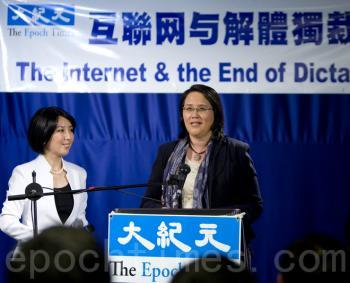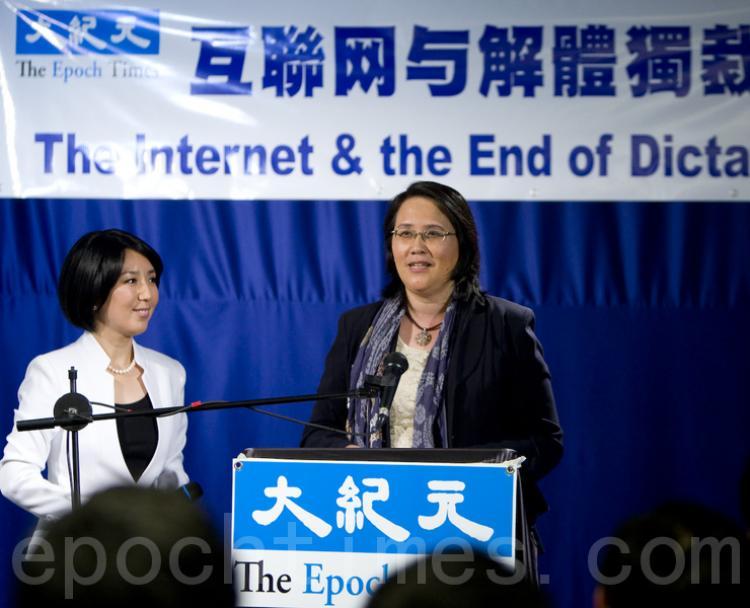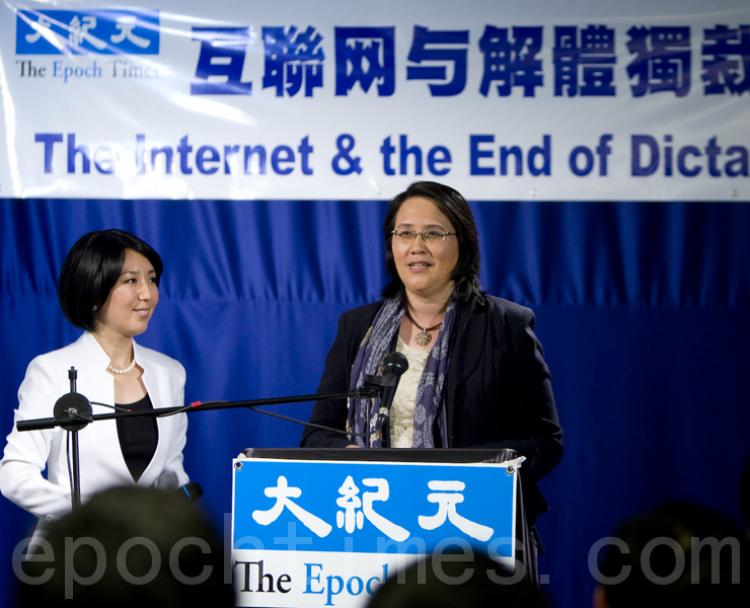A number of Chinese citizens made recordings of their feelings on this issue, some of which were played back at the seminar. They expressed their appreciation to the overseas Internet experts for making anti-censorship software.
Several experts in the seminar proposed a new catchphrase for the Internet: “Have you quit?” (i.e. quitting the affiliates of the CCP such as youth groups or the military.) This, it is thought, will stimulate more Chinese to quit these CCP organizations.
“In these past two years,” the Editor-in-Chief of the Chinese-language Epoch Times, Ms. Gao Jun, said, “we have seen an overwhelming uptrend of anti-dictatorship sentiment among China’s netizens. People have started to see the world and to measure right and wrong with their own eyes. Meanwhile, a large number of the Chinese people declare their resignation from the CCP and surf the Chinese Epoch Times website through anti-censorship software every day. Currently, nearly 90 million people have quit the CCP organizations (the Chinese Communist Party, the Communist Youth League, Young Pioneers) as reported on the Chinese-language Epoch Times website.”
Web’s 3 Decisive Factors
“In the Internet era,” she elaborated, “there are three factors playing a decisive role in fostering an anti-dictatorship ideology: One is the truth. The Epoch Times has been reporting the truth blocked by the CCP for several years. Another is that every individual is a medium so that everyone can have their voices heard. The last is that there are thousands of different groups formed via the Internet. These features show that the Internet cannot coexist with dictatorship.”
Alan Huang, an expert with the Global Internet Freedom Consortium (GIFC), said, “The mission of GIFC is to use technology to expose the CCP’s persecution of Falun Gong practitioners and to promote freedom of the Internet. The anti-censorship software developed by Falun Gong practitioners is popular worldwide. It is the most widely used and the most powerful for breaking the censorship among all anti-censorship software. The software is used by the netizens in mainland China. There are one million clicks from China, two million page views, and more than one million netizens from China breaking the CCP’s firewall every day.”
Mr. Zhang Zengjun, a senior network engineer with Google, said that Internet operators are unwilling to cooperate with authoritarian regimes, because web censorship requires much manpower and resources, and the speed of the Internet will be slowed. And there is the risk that, as a business, a company might be closed down because of the censorship.
Feng Congde, a student leader during the 1980s Tiananmen Movement, believes that the CCP is not able to completely seal off information from the people. “If the Internet is cut, there are still cell phones; if they are cut, there are still the short-wave channels of Sound of Hope Radio Network,” said Feng.
Kudos for Blockade-Busters
Many netizens in China including government officials, economists, experts, and professors asked The Epoch Times’ reporters to express their thanks to the overseas anti-censorship experts in the seminar.
“Through the anti-censorship software, we can learn real information unfiltered by the CCP. We browse many overseas websites, and acquire many new facts. We learn more about the CCP’s dictatorship and what a vicious manipulator it is,” said Mr. Zhang, a netizen from Xinjiang.
“We want to repeatedly express our gratitude to the overseas experts of anti-censorship software,” Sun Wenguang, former professor of Shandong University, said. “Without it, we could hardly have access to overseas news.”
“The Falun Gong experts make anti-censorship software for us. I say it’s the greatest contribution to the progress of Chinese society,” said Qi Yanchen, an economist in mainland China.
The meeting was hosted by the Sound of Hope anchor, Ms. Gao Jie, and The Epoch Times Website Chief Editor, Mr. Jan Jekielek.
Read the original Chinese article



